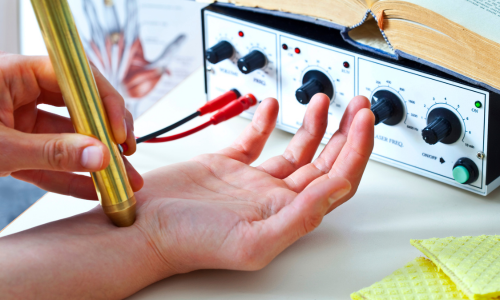

Neuropathy
Understanding Neuropathy: Causes, Symptoms, and Treatment
Introduction:
Neuropathy, a condition affecting the nervous system, can have a significant impact on one’s quality of life. Understanding its causes, symptoms, and available treatments is crucial for those affected and their caregivers. This comprehensive guide aims to provide valuable insights into neuropathy to help individuals navigate through this challenging condition.
What is Neuropathy?
Neuropathy refers to a broad term encompassing conditions that involve damage or dysfunction of the nerves. These nerves play a crucial role in transmitting signals between the brain, spinal cord, and other parts of the body, controlling various bodily functions and sensations.
Causes of Neuropathy:
Neuropathy can arise from a myriad of causes, including:
1. Diabetes: Diabetic neuropathy is one of the most common forms, resulting from prolonged exposure to high blood sugar levels.
2. Trauma: Injuries, accidents, or surgeries can damage nerves directly.
3. Infections: Certain infections such as Lyme disease, shingles (herpes zoster), HIV/AIDS, and hepatitis C can lead to neuropathy.
4. Autoimmune Diseases: Conditions like rheumatoid arthritis, lupus, and Guillain-Barré syndrome can trigger neuropathic symptoms.
5. Toxic Substances: Exposure to toxins, including heavy metals, certain medications, and chemicals, can damage nerves.
6. Genetics: Some forms of neuropathy have a genetic component, passing from parents to children.
7. Nutritional Deficiencies: Deficiencies in vitamins (especially B vitamins), particularly vitamin B12, can cause neuropathic symptoms.
8. Alcoholism: Chronic alcohol abuse can result in alcoholic neuropathy.
Symptoms of Neuropathy:
The symptoms of neuropathy vary depending on the type and severity but may include:
1. Numbness or Tingling: A common early symptom, often starting in the feet and gradually progressing to the hands.
2. Pain: Sharp, stabbing, or burning pain, which may worsen at night.
3. Muscle Weakness: Weakness or loss of muscle control, leading to difficulty in movement.
4. Sensitivity: Increased sensitivity to touch or temperature changes.
5. Loss of Coordination: Difficulty in maintaining balance and coordination.
6. Autonomic Symptoms: Dysfunction of the autonomic nerves may lead to symptoms like abnormal blood pressure, sweating, and digestive issues.
Diagnosis and Treatment:
Diagnosing neuropathy typically involves a thorough medical history, physical examination, and various tests such as nerve conduction studies, electromyography (EMG), blood tests, and imaging studies.
Treatment approaches aim to manage symptoms, address underlying causes, and prevent further nerve damage. These may include:
1. Medications: Pain relievers, anti-seizure medications, antidepressants, and topical treatments may help alleviate neuropathic symptoms.
2. Physical Therapy: Exercises and physical therapy can improve strength, flexibility, and balance.
3. Transcutaneous Electrical Nerve Stimulation (TENS): TENS therapy involves applying mild electrical impulses to affected areas to relieve pain.
4. Lifestyle Changes: Managing underlying conditions like diabetes, maintaining a healthy diet, exercising regularly, and avoiding alcohol and smoking can help alleviate symptoms and prevent further nerve damage.
5. Surgery: In severe cases, surgical procedures may be necessary to relieve pressure on nerves or repair damaged nerves.
Conclusion:
Neuropathy is a complex condition that requires a multidisciplinary approach for effective management. By understanding its causes, symptoms, and available treatments, individuals can work with healthcare professionals to develop personalized treatment plans aimed at improving their quality of life and minimizing the impact of neuropathic symptoms. Early diagnosis and intervention are key to preventing complications and maximizing therapeutic outcomes. If you suspect you may have neuropathy or are experiencing symptoms, consult a healthcare provider for proper evaluation and management.

